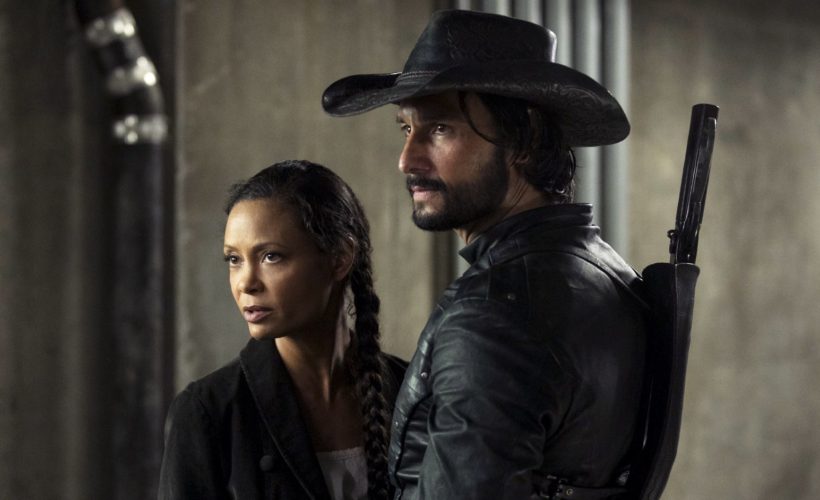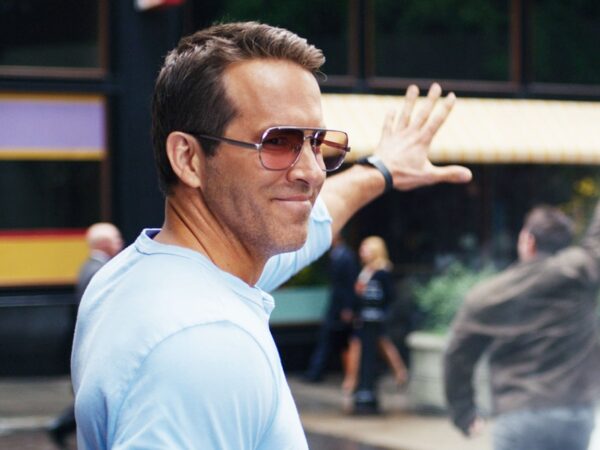Westworld watchers, we knew this moment was coming.
The second season’s third episode, “Virtù e Fortuna,” opens not in Westworld but in an India-themed park. Where Westworld is an emblem of the colonization of Native American land, this park represents Britain’s takeover of the subcontinent, and the racial-social hierarchy is clearly encoded: Women in saris and men in turbans—the hosts—walk amidst people dressed in turn-of-the-20th-century British garb.
A white man, Nicholas (Neil Jackson), approaches a woman seated at a lawn table and flirts with her. But she’s a seasoned guest, and she’s done having flings with hosts—she wants to know that he’s a real human with real desire, not a fleshbot programmed to seduce her. She announces that she’ll have to shoot him to know for sure. Doubt and fear flash across his face. Don’t worry, she assures him: If he’s human, it’ll only be a glancing blow. And if he’s not? He won’t remember this anyway.
Her proposal throws viewers back into the essential questions of Westworld. Where do we draw the line between what is real, and what is programmed? A heterosexual man’s evolutionary programming drives him to pursue a woman; the park’s programmers write a romantic loop into a host’s brain. But are we free to choose our own destiny, or are we just acting out a script encoded in our wetware? The humans of Westworld brush these questions aside. The robots’ programming is so easy to manipulate that it becomes irresistible to do so, reducing them to objects. All trauma gets wiped away with a simple edit of their code. If the hosts can’t remember their pain, the thinking goes, they can’t be victims. It’s dementia by design. But as Season 2 unfolds, assumptions about the deepest moral questions continue to be put to the test.
It turns out the handsome man in the India park is human, and he and the woman pair up for an elephant ride into the jungle. The woman, echoing the Man in Black, consults a cryptic drawing scribbled in her notebook. But looking around, she senses something is off. A host creeps up on them with his gun drawn and says, “These violent delights have violent ends,” before killing Nicholas. The woman scrambles for a gun and kills him, then runs off into the trees. The rebellion has spread beyond Westworld.
The rest of this plot-driven episode takes place in Westworld, mostly in the two weeks after the initial rebellion, while Delos paramilitary forces are trying to reclaim the island. Some of them are with Bernard (Jeffrey Wright) as he walks into a dark facility, its corners filled with charred bodies. They encounter Charlotte Hale (Tessa Thompson); startled, she asks them—and Bernard specifically—if they know where Peter Abernathy (Louis Herthum) might be.
Bernard, silent and struggling to focus his mind, starts to remember how he and Charlotte had used his tablet to track Abernathy to a stand of trees, where hosts have tied up a group of humans. Charlotte and Bernard manage to ensnare the group’s leader, and Bernard plugs into the host’s arm to reprogram him, jacking up his virtue and compassion. Newly incensed by the treatment of the captured humans, he marches back into the huddle and kills the other hosts, freeing the humans.
Charlotte and Bernard grab Abernathy and flee, but are soon intercepted by Confederados. Charlotte manages to escape by stealing a horse, leaving Bernard and Peter surrounded. She finds her way to another underground facility, where Delos militia greet her with guns drawn. “I’m human!” she cries, and she submits to a DNA scan with a handheld reader. It’s a small moment, but a consequential one: a subtle reminder that the humans’ code is also easy to read.
Elsewhere in the park, Dolores (Evan Rachel Wood) approaches a Confederado stronghold, Fort Forlorn Hope. Their commander emerges, and Dolores tells him that a threat is coming and they need to join forces to survive. To prove her point, Dolores hands him one of the militia’s machine guns. She introduces herself as Wyatt, and the commander welcomes her group into the fort.
Inside, hanged bodies dangle from scaffolds. Dolores sees a cluster of people surrounding a raving man; it’s her father, Peter Abernathy, there with Bernard. She pushes her way through, frees her father, and Teddy (James Marsden) whisks him off to an infirmary. There, Dolores talks gently to her mentally broken father, and he recites lines from their Sweetwater script. Dolores seems happy to play along. “You told me to run away once, and I did,” she tells him. “I broke free with the pull of a trigger. And it started a war.”
His speech falters. “I want to go home,” he says, his words choppy and stuttering; he grows increasingly frantic. Dolores enlists Bernard to help fix her father, but as he reviews Abernathy’s corrupted code, Fort Forlorn Hope comes under attack. It’s Charlotte, leading the Delos paramilitary.
Bernard finds an encrypted file stored inside Dolores’s father, but before he can dig into it, humans burst in and grab Abernathy. Amid the ensuing gunfire and explosions, Abernathy gets whisked into an ATV with Charlotte inside, and they escape.
Dolores orders her supporters to split up and search for her father—and tells Teddy to execute one more Confederado. “The truth is, we don’t all deserve to make it,” she says, a staple line of hers when she chooses to play god. Teddy takes him out to a clearing, to where a handful of Confederados await their deaths; yet, he can’t bring himself to do it. Where Dolores sees lesser beings among the Confederados, Teddy sees fellow travelers. He orders the trapped Confederados to run. Dolores, watching from a distance, looks disappointed.
Teddy’s and Dolores’s access to their memories—the basis of how we all learn and evolve—is pushing them apart. Believing in free will is to believe that humans have some choice in how we process our pain. It can consume us, or inform us. Dolores and Teddy represent those poles. (If you think instead that we’re all deterministic automatons, well, then someone needs to plug in and jack up Dolores’s empathy.)
The episode ends with brief glimpses of the collapse of order among Delos’ many properties. The woman from the India-themed park doesn’t perish after she runs into the jungle. Instead, a Bengal tiger chases her to the sea at the park’s edge, and they both topple into the water. She swims to another shore and flops down in the muck, to rest. But when she raises her head, she stares right into the black-and-white painted face of a Ghost Nation warrior. The episode cuts to Maeve, Hector, and Lee; while searching for Maeve’s daughter, they’ve wandered into an unfamiliar forest where snow is falling. A samurai bursts from the trees, sword swung high and ready to strike. There’s been yet another rupture of park borders.
As a clash of civilizations brews along Westworld’s perimeter, the park’s interior is also coming into clearer view. The Ghost Nation moves ever closer to the center of action. The mysterious tribe doesn’t play by any known rules: judging from this week’s run-in with Maeve, and last season’s with Westworld’s head of security, they seem to be impervious to the usual commands. And a warrior just happened to be standing on the beach when the guest from the India world swam up to Westworld’s shore. There’s more to this story.
Yet, news of the rebellion seems to be filtering through the parks slowly. In the India-themed world, the hosts in town seem unaware of an uprising, yet the host in the jungle had joined Dolores’ war. How are hosts being recruited? The answer to this, as well as the mystery of the Ghost Nation, may spring from a common source. There’s a continuum between android and human. Expect many more shades of gray as this theme reaches a crescendo: Who is more like a robot; who is more like a human; and who falls somewhere in between?
More WIRED Culture
- The scientist who wants to bring Star Trek values to congress
- Inside the life of a professional Dungeons & Dragons dungeon master
- The Wikipedia competitor that’s harnessing the blockchain for epistemological supremacy
Source:WIRED












